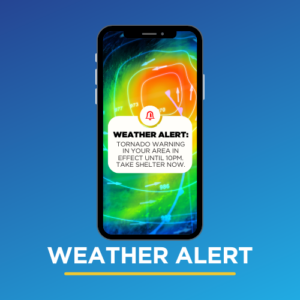Every seasoned healthcare professional understands that a career in this field takes you beyond the comfort of your local hospital or clinic. With healthcare professionals being so in demand, you may find yourself on a travel assignment, far from home and in unfamiliar surroundings. While this can be an exciting opportunity for growth and learning, it also means being prepared for a variety of situations, including weather emergencies. How can you brace yourself for unforeseen weather events like snowstorms or hurricanes while you’re on assignment? Let’s find out.
Understanding the risk
Embarking on a travel assignment involves more than packing a suitcase; it requires an understanding of potential weather hazards associated with your destination. Prior to accepting an assignment, take some time to research the area’s typical climate and weather patterns. What season will it be during your stay? What types of weather emergencies does the region commonly experience? Being aware of the likelihood of a snowstorm in the Northeast, a hurricane in the South, or a tornado in the Midwest can equip you with valuable knowledge. This awareness helps you to anticipate what you might face, ensuring you can effectively respond if a weather emergency does occur during your assignment. This knowledge also informs your preparation, from packing appropriate clothing to ensuring you have necessary emergency supplies.

Safeguarding your health and wellbeing
During a weather crisis, it’s natural to prioritize patient care, but your health is just as essential. Practicing stress management techniques, like deep breathing or meditation, can help maintain your composure and clarity. As a healthcare professional on assignment, remember, you need to be in good health to effectively care for others.
If you are concerned about how to safely get to and from work during an unexpected weather event, reach out to your manager. Oftentimes, hospitals have systems in place to help workers get safely to and from work. Some hospitals have crews that will transport workers to and from the hospital if you are close to the facility. During hurricanes, many hospitals have designated teams of people who will stay in the hospital to ensure continuity of patient care. This protects workers from having to risk coming and going during severe weather.
Maintaining communication
During a weather emergency, consistent communication is key. It is essential to remain in touch with your recruiter and your agency. At Travel Nurses, Inc. we have 24/7 clinical support and after-hours staff here to help you in these situations. Your communication efforts should also include your work environment. Familiarize yourself with the chain of command at your hospital for emergency situations, and promptly connect with the appropriate personnel if you have any uncertainties or need support. This proactive communication approach can greatly aid in coordinating response efforts.

Knowing your role and responsibilities
In times of weather emergencies, your contribution as a healthcare professional becomes even more critical. It is important to understand what facilities expect of you while on assignment. There may be instances where you may be required to extend your regular working hours, be on standby for urgent calls, or even carry out tasks that aren’t part of your daily routine (but are still within your scope of practice). As a traveler, this is where rubber meets the road. Hospitals are already short-staffed, and they need you. Being available to help during emergencies is why you are there. It is important that you be available to help during times of crisis that a hospital faces. They might not call you in, but it is important that you be available to help with their staffing needs.
Understanding your role not only contributes to your personal preparedness but also bolsters the hospital’s overall response plan. Familiarize yourself with the specific protocols and procedures that your facility follows during emergencies. Following these guidelines ensures a smooth flow of operations and secures the safety and well-being of everyone involved. Embrace the responsibility, keeping in mind that during emergencies, hospitals need you most.